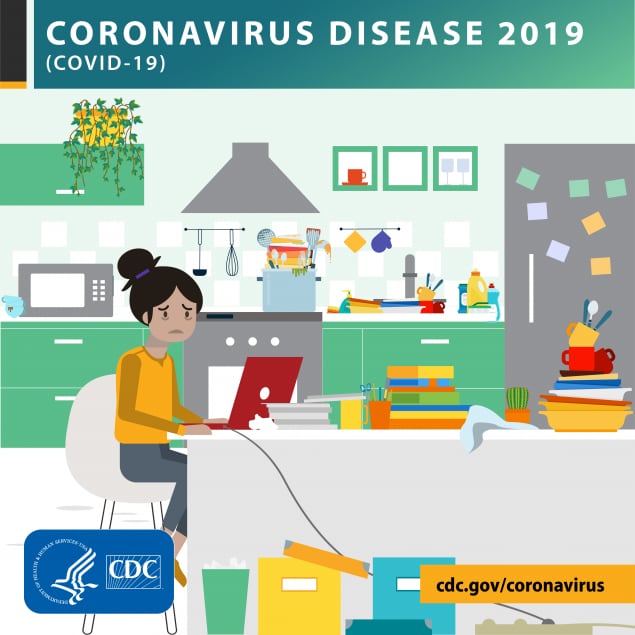Health, Wellness, and Mindfulness Resources for Home
Written by: Leslie Ballentine
Overall health is a combination of physical, emotional, and psychological wellness. When you want to be truly healthy, you need to take care to put the best foods and drinks into your body. You also need to use your body regularly, giving it beneficial activity and exercise so you maintain healthy muscle and avoid adding excess weight. Wellness also involves monitoring your emotional and psychological health by practicing mindfulness, which can help reduce anxiety and help you feel happier.
Overall Health and Wellness
- How to Eat Healthy: Eating healthy includes focusing on fruits and vegetables, choosing whole grains, and eating foods that are low in fat.
- Healthy Eating for Healthy Weight: A healthy diet should include lean meats, skinless poultry, fresh fish, beans, and eggs to provide protein.
- How to Build a Healthy Eating Pattern: Variety is important when eating healthfully, so it’s important to eat foods from all of the food groups to get all of the necessary nutrients.
- Ten Tips: Healthy Eating for an Active Lifestyle: Choosing foods with a high nutrient content such as whole grains, lean proteins, and low-fat dairy products helps to provide the necessary vitamins you need without excess calories.
- Healthy Weight: Maintaining a healthy weight can be challenging, but obesity can lead to serious health complications such as heart disease, kidney disease, and type 2 diabetes.
- Make Healthy Choices for Your Lifestyle: Unhealthy life choices such as inactivity, poor diet, and smoking can lead to chronic illness and even premature death.
- What Is a Healthy Relationship? A healthy relationship involves healthy communication, boundaries, and mutual respect between parties.
- Healthy Habits for Healthy Kids: When parents model wellness and healthy habits such as eating a balanced diet, children are more likely to follow their parents’ lead.
- Weight Loss: Losing weight can be challenging, but being ready to make permanent and beneficial changes in your lifestyle is the first step to success.
- How to Handle Food Cravings: Craving unhealthy food can be difficult, but you can overcome these impulses by scheduling your eating, keeping a journal of your craving tendencies, and choosing distractions instead of eating when cravings hit.
Mindfulness Resources
- What Is Mindfulness? Being mindful is being fully present and focused on where you are and what you are doing.
- Definition of Mindfulness: Being fully present in the moment has a number of benefits, from decreasing anxiety and sadness to increasing happiness.
- What Is Mindfulness? Definition and Benefits: Practicing mindfulness is one way of combating stress in daily life because it helps enhance inner peace.
- Three Definitions of Mindfulness That Might Surprise You: Mindfulness helps you stop taking things for granted as you learn not to assume and expect things to stay the same all the time.
- How to Practice Mindfulness: Overthinking everything often results in anxiety, but slowing down and practicing mindfulness can help alleviate these feelings of stress.
- How to Practice Mindfulness: A Beginner’s Guide: When you first start trying to practice being more mindful, you may feel restless and uncomfortable because your mind is not used to the lack of stimuli.
- Ten Simple Ways to Practice Mindfulness in Our Daily Life: Practicing mindfulness can help you achieve new goals in your life, such as becoming healthier, earning a degree, or learning a new skill.
- Overview of Mindfulness: Sometimes, taking just a moment to be mindful can help you manage a stressful situation.
- Ten Ways to Practice Mindfulness and Be More Present: When you find yourself waiting in line or at a traffic light, take the time to breathe deeply and let go of your impatience or irritability.
Fitness and Exercise at Home
- How Ten Minutes Can Be a Workout: If you only have a few minutes, try taking a brisk walk, running up and down the stairs, or dancing to your favorite song.
- How to Exercise at Home During the Coronavirus Outbreak: If you can’t get to the gym, try doing a cardio workout video or doing some strength training at home instead.
- 27 of the Best Exercises for Beginners to Try at Home: Beginners can start working out by doing push-ups, standing shoulder presses, and squats and skipping rope.
- No Gym Required: How to Get Fit at Home: Even from home, you can incorporate the elements of a full workout into your exercise by warming up, elevating your heart rate with cardiovascular exercise, doing some resistance exercises, working on flexibility, and then cooling down.
- How to Exercise at Home and Actually Like It: Try streaming workouts from gyms and trainers to exercise at home.
- The Seven Best Home Workout Routines: The Ultimate Guide for Training Without a Gym: Don’t forget to warm up and cool down when you exercise at home so you get in a full workout.
- Ten-Minute Workouts: Working out for just 10 minutes can be a great way to squeeze in some exercise when you have a busy day.
- Exercising During the COVID-19 Pandemic: You Have Options: Weight training and yoga are two forms of exercise that you can do virtually anywhere.
- How to Exercise at Home During the Coronavirus: While you could buy a treadmill or an elliptical machine to use, you don’t necessarily have to spend a lot of money to exercise at home.
- The Simple, No-Equipment Workout You Can Do at Home: Circuit training involves performing a sequence of exercises such as squats, push-ups, hip raises, and planks over and over again to raise your heart rate and build strength.
